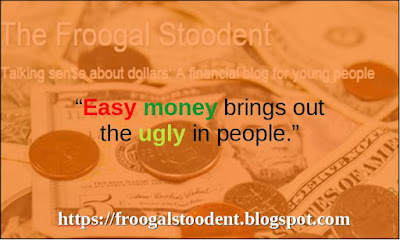The Best Way to Wealth
A Tweet recently caught my eye: “One of the best ways to get rich is to be born into a rich family.”
I politely disagreed, and thought it was worth elucidating in a longer post here. Inheritance is probably the easiest way to wealth.
Doesn’t that make it the best way?
Let me tell you a quick story about easy money. I’ll provide a link to the full story, if you’re interested in all the gory details. But first, the thumbnail sketch:
In 2002, West Virginia’s Jack Whittaker won the Powerball for $314 million, which was (at the time) the largest lottery payout for a single ticket. Whittaker took a much smaller lump sum that amounted to about $113 million after taxes.
Still, $113 million is a lot of money. Even to Whittaker, who owned a contracting business laying pipe.
He had reportedly built a $17 million business already, so he didn’t really need the Powerball funds. So, Whittaker promised to start a charitable foundation to benefit the needy, and donate millions more to build a new church.
People begged him for money in person, and submitted heartbreaking sob stories via mail. In fact, Whittaker got so much mail, he had to hire three people to sort through it, and also hired private investigators to verify the details of some of these requests.
But Whittaker wasn’t interested only in charitable causes. He also wanted to enjoy the rest of his life, as he had some health issues and figured he’d have about a decade left. So, on New Year’s Eve of 2002, just a couple days after his big win, Whittaker went to the local strip club and plunked down $50,000 on the bar.
That was just the first sign of what was to come.
Whittaker was the victim of numerous attempted robberies and lawsuits. Public opinion turned on him too, after a little while.
It was mainly brought on by his own behavior—he was seen in clubs and casinos, pawing at women other than his wife, and he was charged with DUIs on more than one occasion.
But that was the happiest part of the sad saga.
Thanks to his drinking and womanizing, Whittaker’s wife left him, after almost 40 years of marriage.
His granddaughter Brandi—15 at the time of Whittaker’s Powerball win—got involved in drugs, enabled by a constant flow of cash from Paw-Paw Whittaker. In September 2004, Brandi’s boyfriend was found dead of an overdose, in the bedroom of a home owned by Whittaker. And in December, almost 2 years to the day after Whittaker bought the winning ticket, Brandi herself was found dead at a friend’s property, her body wrapped in a tarp. Cocaine and methadone were found in her system.
In July 2009, Whittaker’s only daughter, Ginger, was found dead. The cause of death was not made public, but authorities said they do not suspect foul play. She had apparently been fighting cancer for several years, though it is not public whether that was the cause of her death.
In 2016, Whittaker’s house burned down, and he did not have insurance on it.
And Whittaker claimed that, in an apparently carefully-planned heist, thieves simultaneously hit 12 different branches of a bank and robbed him of much of his money.
The clerk who sold Whittaker the winning ticket summed it up best: “It seems like money brings out the ugly in people.”
April Witt’s entire story on the matter, first published by the Washington Post in 2005, is well worth a read. But if you consider the tragic story for a while, you just might come up with some powerful insights.
For example: if money brings out the ugly in people, why wasn’t Whittaker already getting himself into trouble?
After all, he already had his own company. He already had a pretty nice amount of money even before winning the lottery. So why wasn’t he already driving under the influence, or frequenting strip clubs and grabbing at women who weren’t his wife?
Why wasn’t he already giving his granddaughter enough money to buy drugs? With a $17 million business to his name, he clearly could have afforded it!
I think the answer is clear. Whittaker accumulated his money slowly, over a long period of time. He had to work for it. And think carefully about how to handle it.
I’d like to amend the clerk’s quote a bit. “Easy money brings out the ugly in people.” Or perhaps, “fast money brings out the ugly in people.”
People might be a little jealous if, over the course of a lifetime, you accumulate a couple million dollars by retirement age. But if they think it came to you easily, or quickly—in essence, that you didn’t do anything to earn it—that seems to be when the claws come out.
Maybe it’s pure jealousy. Maybe it comes from a sense of injustice, as if they’ve been wronged by fate because this good thing happened to someone else. Or maybe people have a sort of instinctive disdain for ease, an understanding that the good fortune can vanish as quickly as it arrived. “Easy come, easy go.”
I suspect it’s probably a combination of them all.
Back to the initial Tweet: while everybody thinks they want to inherit money, nobody actually likes an heir. Nobody respects someone who didn’t earn his or her own money.
So, if inheritance isn’t the best way to acquire wealth, what is?!
My response on Twitter sums it up pretty well, I think. I’d rather earn it, save it, and invest it for myself. In the process, I’ll learn. And, hopefully, I’ll learn enough to avoid the fatal errors that ensnare so many.
Like Jack Whittaker.
___
Check out my book-review series, available now:
1. Debt: The First 5000 Years by David Graeber
2. Rich Dad Poor Dad by Robert Kiyosaki
3. The Clash of the Cultures by John C. Bogle

No comments:
Post a Comment